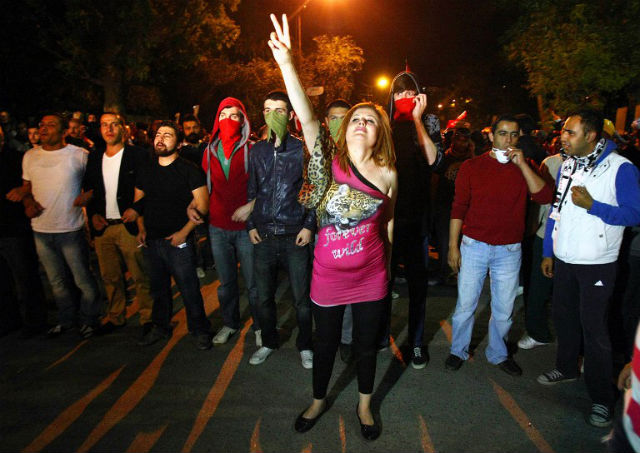SUMMARY
This is AI generated summarization, which may have errors. For context, always refer to the full article.

ISTANBUL, Pakistan – Police sealed off a flashpoint Istanbul park on Sunday after firing tear gas and water cannon to dislodge thousands of protesters in a night of violence that sent tensions soaring in Turkey’s relentless anti-government unrest.
Riot police were still sporadically clashing with pockets of protesters in streets near Gezi Park as tens of thousands of supporters of Prime Minister Recep Tayyip Erdogan began gathering for a rally 10 kilometres away.
The operation to clear Gezi Park on Saturday evening came just two hours after Erdogan issued an ultimatum to demonstrators to end their two-week occupation of the site, the symbolic heart of nationwide protests against the government.
Thousands of campers scrambled to escape the clouds of acrid smoke, as officers with gas masks and riot shields stormed the patch of green, clearing it within minutes and leaving a trail of empty tents in their wake.
Many demonstrators sought refuge in the luxury hotels bordering the park, prompting police to douse the lobby of at least one five-star establishment with water, as guests choked on tear gas fumes.
“We have an Istanbul rally tomorrow (Sunday),” Erdogan told tens of thousands of cheering loyalists at an election rally for his ruling Justice and Development Party (AKP) shortly before the police operation.
“If (the area) is not evacuated, this country’s security forces know how to evacuate there,” he said in the capital Ankara.
“Nobody can intimidate us,” he added. “We don’t take orders or instructions from anybody except from God.”
As the clashes raged in Istanbul, thousands of anti-government demonstrators took to the streets of Ankara and the western city of Izmir in solidarity, though the demos stayed peaceful.
It was Gezi Park that first lit the flame of the unrest that has rocked Turkey. On May 31, a peaceful sit-in to save the park’s 600 trees from being razed in a redevelopment plan was met with a brutal police response, snowballing into angry demonstrations against Erdogan across the country.
Critics accuse the premier of increasing authoritarianism and of forcing Islamic conservative values on the mainly Muslim but staunchly secular nation of 76 million.
The crisis has claimed four lives and injured nearly 7,500 people so far, according to the Turkish Medical Association, and represents the biggest challenge yet to Erdogan’s decade-long rule at the head of an Islamic-rooted government .
Mey Elbi, a 39-year-old yoga teacher, was in Gezi park when police entered.
“They took our goggles and gas masks,” she told AFP.
“I won’t give up,” she vowed. “We’re angry, this is not over. The world has seen that together, we can stand up to Tayyip.”
The Taksim Solidarity group, seen as most representative of the protesters, condemned Saturday’s “brutal attack”.
“The police raid left hundreds of protesters injured and there are dozens more who were hit by rubber bullets,” it said in a statement.
Istanbul governor Huseyin Avni Mutlu said 44 people had been injured in Saturday’s trouble, none seriously.
On Sunday, police strictly controlled access to Gezi Park and the adjoining Taksim Square, another focal point for protests.
Yellow tape lined the area, blocking entry to pedestrians, as refuse trucks and bulldozers removed debris and broke up protesters’ makeshift barricades.
‘Nightmare needs to end’
“The government could not have let this occupation go on forever,” AKP deputy leader Huseyin Celik said in televised remarks overnight. “This nightmare needs to end.”
Earlier, Celik said Erdogan had felt “cheated” after protesters rejected his olive branch to abide by a court-ordered suspension of Gezi Park’s redevelopment.
The Taksim Solidarity group on Saturday said it would continue its resistance because the protest had become something bigger than a conservation fight.
The protesters said the government had failed to address all their demands, which include a call for arrested demonstrators to be released and for police chiefs in cities that saw clashes to be sacked.
The United States and other Western allies, along with human rights groups, have widely criticised Erdogan’s handling of the crisis.
While opposition to Erdogan is intense, the 59-year-old has been in power since 2002, boasting three election victories in a row. – Rappler.com/AFP
Add a comment
How does this make you feel?
There are no comments yet. Add your comment to start the conversation.